The first guest on Anika Moa's new podcast, It's Personal with Anika Moa, is the oscar-nominated producer Chelsea Winstanley.
Chelsea's rise to the top has been littered with potholes - childhood abuse, a life-shattering car accident and a high-profile marriage breakdown. But she proves Anika's theory that the most interesting and inspiring people have often been broken and had to rebuild.
Follow It's Personal with Anika Moa on YouTube, Apple Podcasts, Spotify, iHeart or wherever you get your podcasts.
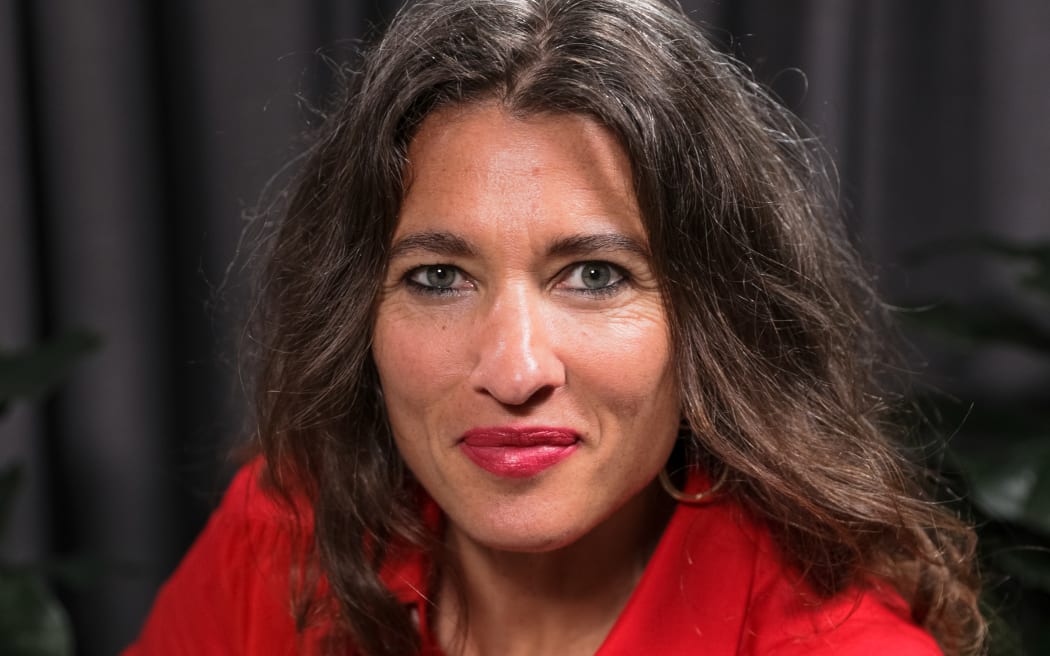
Chelsea Winstanley Photo: RNZ / Cole Eastham-Farrelly
On translating Disney movies
"Why not? I think if we want to make an impact or a change with our language in this country, we need to go to and work with the biggest global giant in the entertainment industry.
"One night we were having dinner and we just got out those chalk pen things and wrote on the windows. We were like, what kind of contribution could we make towards te reo Māori for our kids, for our mokopuna, for our babies, and in the future and what do we do in our lives daily that we could enhance that? So, okay, we work in this industry, what would it look like if we just took product in our sphere, in what we do and put that into te reo Māori and put that into public spaces.
On making it happen
"At the time, Taika was editing Thor so he's on the Disney lot. I said to him, give me the person who can [help me] make a connection with Disney. He didn't really have anyone we could specifically talk to, but gave us, like, the intern of someone else. She was a young Hawaiian woman, she put us on to one of the producers, who then put us onto the guy in charge of international voices."
"So I get on a plane and go to LA, because we decided to move over there at that point, take the kids. And so I walk into the Disney studio lot, thinking it was probably going to be me, Rick, and one other. It's like a whole big boardroom table with about ten people. And then [I] just basically winged it. They were like, 'oh, this sounds great'."
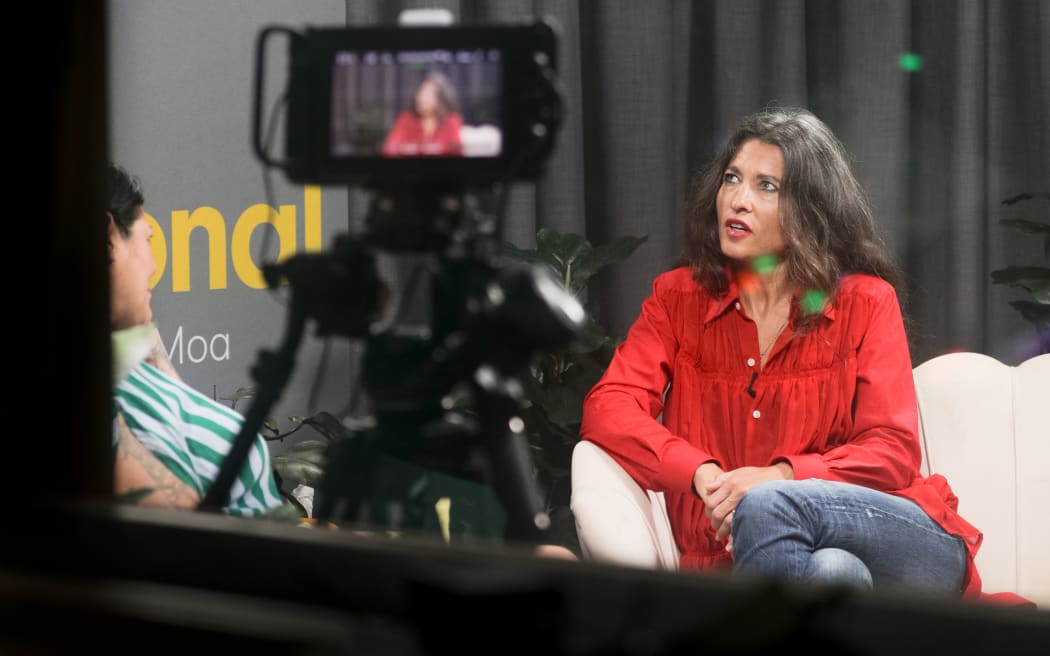
Chelsea Winstanley Photo: RNZ / Cole Eastham-Farrelly
On chasing her dreams while solo parenting
"It's a humiliating space to be in, the DPB. You feel heaps of whakama/shame that you're taking taxpayers money so you can feed your kid. And that's not a good space to be in. It's not the right motivation for you to want to go back and study, for you to feel shame. It should be more like, oh, I want to further my education and it was, I wanted to build a life for my son, I suppose."
"So me and another solo mum, we were both like, solo mums living together. And we'd take our babies off to the kohanga before Uni and we were both studying communications."
On the car accident
"I didn't even finish out that year. My Maori whakapapa is a little place called Te Puna. So I would try and drive over the Kaimais, which is from Hamilton to basically home, because I wanted to go home and learn. And it's pretty icy and dicey during the winter months. Anyway, I just lost control of the car, smashed everything up. And I was out of Uni, out of action. Had to learn how to walk again. Broken legs, broken face, broken everything."
On getting back to business
"I got my first job out of Uni with Rhonda Kite and Libby Hakaraia. It was an affirmation too, seeing two Māori women owning their own business and producing content that was really about uplifting and celebrating Māori or challenging and dealing with issues te ao Māori. So for me, I was like, oh, you can, be successful in this space and own your own stories."
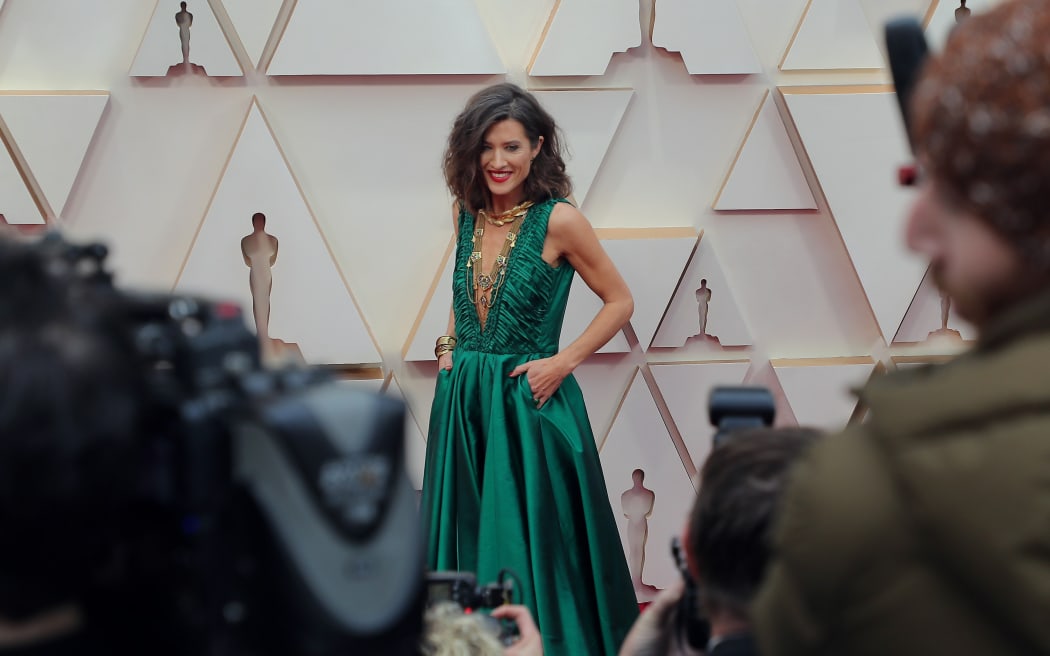
In 2020, Chelsea was the first indigenous woman to be nominated for a Best Picture Academy Award, for Jojo Rabbit. Photo: Neilson Barnard / Getty Images / AFP
On motherhood, mahi and a marriage breakdown
"I want to be really honest and own my participation in the unraveling of our relationship because I didn't want to be the dutiful wife and race over to the Gold Coast where he was making Thor and sit in an apartment all day long twiddling my thumbs. Also that would mean I'd have to take my babies out of Kohanga reo and that to me was really important. So I said, 'I'm not going to do that, but we'll come over and visit'. That probably was the beginning of the unraveling. And probably my stubbornness in that moment because I'm not that. I am my own person and I want to do my own things. And I'm glad I actually did, because I did Waru while all that was happening. I did Merata's film with Heperi and Cliff, which was again, that's true to me, those projects and that type of storytelling, that's me."
"And thank my tupuna or whoever was kind of looking after me in that moment, because I think I probably needed that. I needed to focus on my own stuff, because it reaffirmed for me that I can do that. I don't need anyone else for me to be able to be happy, in control, or do what I want to do in the spaces that I love doing."
"I think I was married to someone who really, was just on their own buzz and, like, tunnel vision for whatever reasons, you know? And we're all on our own journey as far as I'm concerned. So to help me get me through on a daily basis, I just remind myself I'm not responsible for what anybody does. I'm only responsible for the way in which I react to that. Therefore, to try not take anything too personally."
On overcoming trauma
"I think as time goes by you're actually angry at yourself for not believing that you deserved better."
"I remember having the most incredible lunch with this amazing woman in New York a few years ago, and we were just talking about things that you've endured. She was like, 'what I think I've done based on my own childhood trauma, what I've realized, is so long as what I was doing wasn't as bad as the childhood trauma, it was okay. And what I've realized is I was just upgrading my abuse'. I was like, penny, drop."
"So long as for me, in my situation, so long as what I was putting myself through wasn't as bad as the childhood rape, then basically I could handle it. But what I didn't realize, what I was doing was just upgrading the abuse."
"And so it's a good reminder, that you can change that narrative at any point as well."
"I've done heaps of work on this. If you're forming the basis of who you are based on being a sexualized person to men, if you like. And then that's all you are. Because in your childlike mind, that's all you are, an object of desire, then that's almost your currency. It becomes your currency because no one's telling you you're smart, no one's telling you that you're intelligent or anything else. You're just a thing to be used."
"So you have to unravel that and unpack that throughout your life. And you might make some really shitty mistakes and decisions based on that, if that's what you think you are. So you have to then go through your life forgiving yourself for maybe situations you put yourself in. I've put myself in harm's way. And I've had to then go back throughout my life and not feel disgusted and gross about those choices I made, but forgive myself because they're based on things that I grew up thinking that's all I was worth."
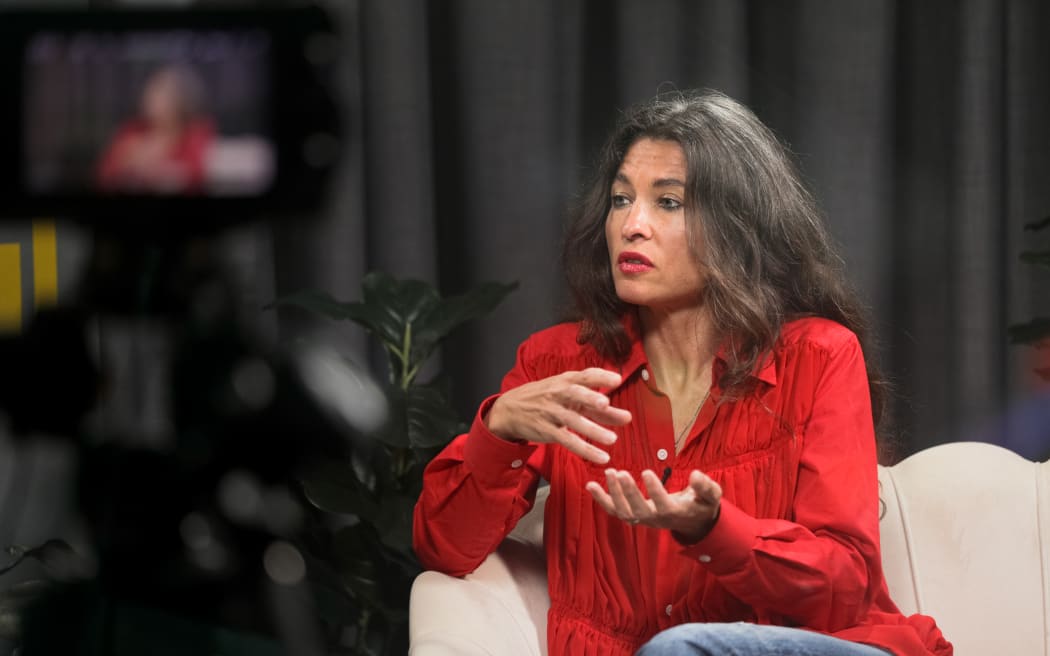
Chelsea Winstanley Photo: RNZ / Cole Eastham-Farrelly
On alcohol
"I was a happy as drunk. I loved it. And I loved the feeling and the vibe. But the reason why I stopped is because, when all the shit was going down in my marriage and it was ending, the drinking was leading to really unhealthy other habits and other things. I knew that in order for me to truly stop repeating mistakes, like, why am I putting myself in harm's way? Why do I not believe that I'm worthy of a much better partner, or putting myself first in my career or speaking up for myself or whatever it might be. So I don't want to do that ever again in my life. I don't want to give my power over to someone else again, linking that back to childhood trauma, like, literally giving myself away because I didn't know anything else. So I'm not going to do that anymore. What can I do to ensure that I'm not going to make those mistakes or put myself in harm's way? I knew that drinking was just a catalyst to other things, so for me, just stop. Just stop that so I don't have to then be tempted by other things. And it was literally like, I just don't want to keep repeating the same shit."
On reclaiming te reo Māori
"I tried to do night classes and all the things and my brain just doesn't retain one two hour class. And even going to Takiura, it was a super hard but beautiful environment to be speaking te reo Māori. But when you're outside of that space, where are the safe spaces that you can go to to speak Maori? And it becomes very clear when you leave that school that this is te ao Pakeha. Because we're not supporting people who are wanting to maintain te reo Maori in public spaces."
"Everyone is crying. It is like therapy 101. Like, go back to the beginning and just get it all out because you're all there feeling shit about yourselves that you don't know te reo Māori yet. I'm nearing 50 and I went there with other mates, so it's so good to go with other friends because you're all just sitting in this crazy trauma together. And it's beautiful. You have a few young people in there, but the majority of the students are, like, middle aged. And we're really fucking upset and sad that we don't have our language, that we didn't grow up. I didn't grow up with it. Having to find it later and trying to learn it, hear it, understand it, you just feel like a dummy. But because you're going through it all together, you're just feeling stupid together.
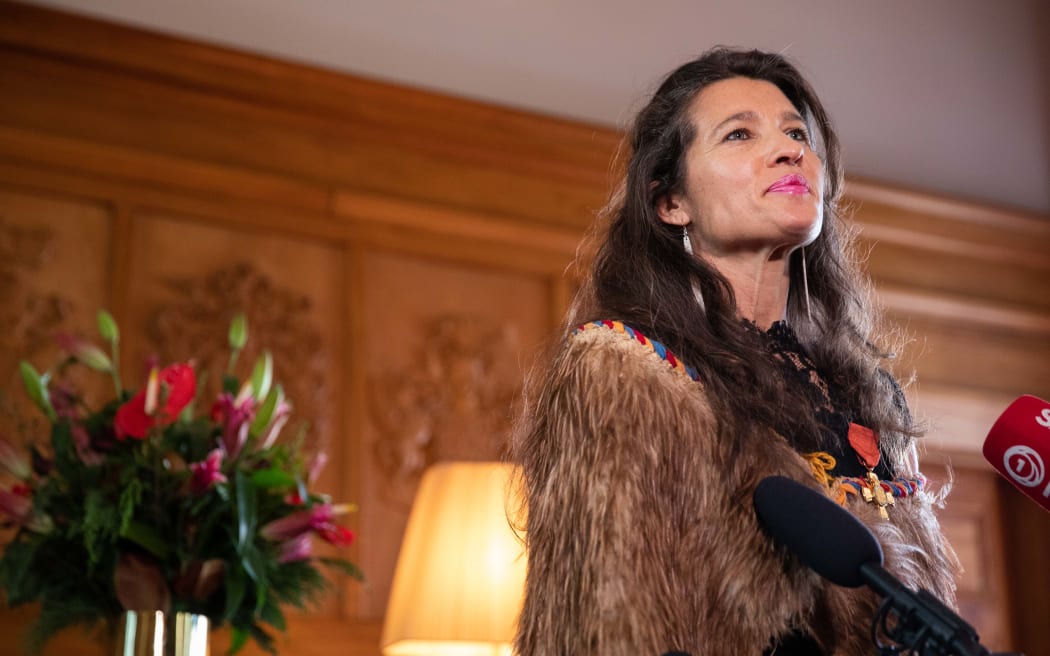
Chelsea was appointed an officer of the Order of Merit for services to the screen industry and Māori Photo: RNZ / Angus Dreaver
What's Chelsea is working on now?
I'm finishing a documentary that I came home to make in 2020. Which sounds crazy, but storytelling takes the time it needs to take. This has been good for me because I have to get back into that space, which I love. That's another thing I've actually really enjoyed about coming home, is returning to the things that I want to do and be in charge of and in charge of creatively.
Next steps
"So I recently got involved with distribution and theatrical spaces cinema, because for me, I've always thought, we're not going to have control of our story sovereignty until we participate in every single part of that filmmaking process. So producing and the production side of things, fine. A lot of us have got that down. We're really good at that, but we haven't participated in distribution or cinema. And those places have so much power, they have so much weight, because if you want to make a film, you want to get some money from the film commission, they're not going to give it to you until you have a distributor to say, yes, I'll show your film. So how many of our stories have not been made, told, or seen because they're like this?"
Where to get help:
Need to Talk? Free call or text 1737 any time to speak to a trained counsellor, for any reason.
Lifeline: 0800 543 354 or text HELP to 4357
Depression Helpline: 0800 111 757 (24/7) or text 4202
Samaritans: 0800 726 666 (24/7)
Youthline: 0800 376 633 (24/7) or free text 234 (8am-12am), or email talk@youthline.co.nz
What's Up: free counselling for 5 to 19 years old, online chat 11am-10.30pm 7days/week or free phone 0800 WHATSUP / 0800 9428 787 11am-11pm
If it is an emergency and you feel like you or someone else is at risk, call 111
Abuse survivors:
Help Wellington, 048016655
Help Auckland, 09 623 1296
For urgent help: Safe To Talk 0800044334

